Down the Rabbit Hole: The World of Misleading and Agitprop Video Essayists
Who critiques the critics?
It doesn’t take much browsing through Youtube or its search algorithms before stumbling upon video essays. Displacing the skit reviews that dominated the platform’s early years (notably represented by James “Angry Video Game Nerd” Rolfe), especially since the site began prioritizing watch-times over views in 2012, these have become a major genre in itself, encompassing various topics and political views. Vox’s Terry Nguyen on March 9, 2022 notably extolled the potential of these works, especially among Zoomers like himself who view these as nuanced, insightful content. At the same time, however, it’s hard to square off those intellectual promises with the world of misleading content and agitprop lurking just beneath.
While touched on back in an April 4, 2022 Areo Magazine piece, involving how filmmaker and journalist Johnny Harris exploited Philippine-American history, this rabbit hole has come under more attention. On May 25, 2024, In Praise of Shadows released a since-deleted video titled "Bad Conservative Horror Movies," which not only became an excuse to smear Youtubers like Isaiah “Wendigoon” Nichols as alt-right reactionaries, but also painted Americans in Appalachia as racist bigots by default. In addition to meeting significant backlash across the board, it all but ruined the essayist’s career especially in light of posts from him actively calling for harassment against his enemies. This wouldn’t be the only instance, whether it’s growing criticism over Breadtuber Harry “Hbomberguy” Brewis’ December 3, 2023 anti-plagarism essay slipping in smears against people he doesn’t like, or Dan “Folding Ideas” Olson’s Jun 20, 2024 attempt to frame a passive-aggressive hitpiece against Rolfe as an introspective conversation buried in multiple layers of irony.
A recurring tendency on social media among defenders of such video essays, regardless of politics, has been to either frame detractors as reactionaries and ignoramuses, or insist that no one’s exempt from criticism, especially when there’s seemingly no harm. Still, a closer scrutiny of the current “Essayist era” of Youtube, even at least for the realm of nerddom, is long overdue. After all, who critiques the critics?
Agitprop in Plain Sight: Moon Channel
Moon Channel is particularly glaring. An essayist Youtuber with a legal background, he’s gained a following since joining in 2020 for offering educational long-form videos appealing to gamers. Covering topics as varied as history, gender and politics, among his notable selling points is pointing out how these relate to gaming and wider nerd culture. While not immune to controversy, a closer look at some of his more recent work, however, shows a less flattering demonstration of how essayists can get away with pushing agitprop in plain sight.
Take the two-parter “Gacha Drama and the Korean Gender War” series from January to February 2024. Using the controversy around the gacha game Limbus Company the previous year (involving false allegations surrounding former in-house artist Vellmori and studio Project Moon) as a branching-off point, the videos discuss South Korea’s culture wars and the gender clashes these are fostering. The bulk of the combined runtime, however, is taken up myriad tangents with making that case about, including a 1997 Korean Air crash, discourse into Confucianism and hyper-conservatism, feminist 4chan-style imageboards such as Megalia, Syngman Rhee and Cold War realpolitik. All the while, these are interspaced with rants against capitalism and how it traditional hierarchies have harmed Korean society. These have the effect of having viewers take the essayist’s word for it from the sheer volume of tangents and subjects covered alone, even with sources listed.
In addition to painting the otherwise peaceful resolution to the Limbus Company and Vellmori controversy in as dim a light as possible, this translates into Moon Channel poisoning the well once he finally gets to discussing the gender wars in detail, from feminist cults and misogynistic mobs, to scenes of those broken under the system. By which point, it not only aligns with Western mainstream media narratives of women fighting back “anti-feminist” backlash but also devolves into a glorified Marxist screed in which even with the suffering men experience in Korean society, they are still made out to be part of the problem due to class struggle. It's hard to shake off how he is twisting a legitimate issue to tell audiences what he thinks they want to hear, while using the seriousness of the issue as a means of eluding deeper scrutiny. The final tangent of reinterpreting another gacha game, NIKKE, as a Battleship Potemkin-style propaganda piece calling on Korean gamers to rise up, is just the icing on the cake.
This conceit of masking what amounts to agitprop in plain sight is unwittingly laid bare in his later “Kawaii: Anime, Propaganda, and Soft Power Politics” feature on June 16, 2024. A purported expose into the dirty secrets of Land of the Rising Sun, it goes at length to tie in various tangents (from World War II and the Liberal Democratic Party to commentary on conservative society) into in a portrait of a state-backed campaign to sugarcoat Japan and hide the dark realities lurking underneath. All these culminating in patronizing platitudes about how it’s fine to consume anime, only that one must be “mindful of what you consume" and that “you are not immune to propaganda.” Even setting aside how that conclusion reeks of certain inane video game critiques about “normalizing Nazis” a cursory knowledge on Japanese history and culture, reveals not only how fundamentally flawed, if not rife with misinformation the essay is. It also reveals its propagandistic nature.
Aside from using a similar barrage of tangents or how the video pathologizes Japan for promoting its culture in any official capacity (when every country does it), the very premise that otakudom’s born from some state-backed plot to stop radicalism in the 1960s falls apart at the seams. Japanese creators then (and now) were politically diverse, with many industry pioneers (including Osamu Tezuka) being antiwar if not part of New Left activist movements, as attested by those who lived through those times such as Armored Trooper Votoms creator Ryosuke Takahashi. It likewise doesn’t help how the sources used by the essayist are, upon closer inspection, either cherry-picked from openly biased pundits, news articles framed in as bad a light as possible, or glorified soapboxes for Hayao Miyazaki’s rants, as well as attempts to demonize Tezuka for being some fascist collaborator due taking inspiration from wartime films the same way George Lucas used Triumph of the Will-style camerawork.
Moon Channel is by no means the first one to make such definitive-sounding claims, given Youtuber Knowing Better’s “Playing the Victim” hitpiece from 2018. Yet the way half-truths and outright slander could he pushed in clear view while still passing the results off as education (be it through exploiting the runtime or capitalizing on the audience’s lack of familiarity) could not be understated. Rather than trying to properly inform audiences who may not be familiar with the topics at hand, essayists like him seem more concerned with slipping in some agitprop of their own. That this winds up poisoning the well and being blindly regurgitated on social media to the point of becoming “common knowledge” seems irrelevant to them, if it means more engagement or additional clout to their name.
Sensational Editing: Hitreg
Other disingenuous video essays try to pull off similar hijinks through sleek production values or using sensationalism to their advantage. One notable example of this when it comes to both concerns HitReg, an otherwise small channel focusing on otakudom that popped in 2021, yet has drawn more attention recently with crisp production values and an erstwhile informative mien. His biggest claim to fame, “This Anime exposed a $28,000,000,000 Sweatshop” released on September 2, 2023, betrays this for a purportedly good cause.
Using the second season of The Promised Neverland in 2021 as a clickbait title and the death of one A1 Pictures animator in 2010 at a starting point, the bulk of the video is ostensibly about the dark side of the anime industry, presenting the subject as if it were something being ignored by otaku until now. It would be one of the worst-kept secrets ever, then, with how it’s been talked about for a long time on Youtube alone, as previously covered in 2022 for Areo. Interestingly enough, a clip of Joey “The Anime Man” Bizinger buying affiliated products is shown as part of a snippet about how production companies are earning more from merchandise than studios are, yet no references to Bizinger himself talking about the industry’s issues for the past several years. It doesn’t help either how the fast-paced editing is used to bombard viewers with various graphs and sources (at times in quick succession) to drive the main point home: a call for action and unionization to save the industry from itself.
Aside from mentioning Toei Animation’s in-house union and statements primarily from Studio Ghibli figures like Hayao Miyazaki (who was involved in pushing for said unionization), the video drives home the impression of a hellish landscape in which nothing seems to be done. Upon closer inspection, however, many of the cited sources are either framed in the worst possible light, heavily skewered to spotlight MAPPA (one of the worst exemplars in the industry), or very biased. This latter point was particularly evident in how the video antagonizes Tezuka (even comparing him with Walt Disney’s anti-unionist stance), echoing the old “Curse of Osamu” in blaming the Astro Boy creator for ruining conditions in the industry. Moreover there’s little to no attention made to other positive developments over the years, whether it’s the likes of Kyoto Animation and Ufotable seeking alternatives to the status quo, or initiatives like the Animator Dormitory Project. Even with the best of intentions, such omissions are glaring.
The video essay was also accompanied by a long blogpost by HitReg on his website, intended to provide further explanations on what he wanted to convey. What it revealed instead was how he not only knew and commended initiatives like the Animator Dormitory Project, but purposefully omitted them outright out of the belief that it would “feel like undisclosed sponsorship.” Meanwhile, other efforts like the Japanese Animation Creators Association (JAniCA) and even Toei’s unionization are either dismissed as failures or downplayed as no one else was in a union. It becomes evident that rather than informing audiences, the aim is exposure, even if it means gratuitous sensationalism. That the piece itself ends with a recitation of the late Satoshi Kon’s final words on pushing forward amidst adversity also underscores an element of emotional appeal that further obscures the half-truths and misinformation on display.
Granted, it may not be too surprising. The creator previously used a video titled “Why this Manga Artist hates his Masterpiece” on January 23, 2023 to "debunk" claims that the mangaka behind SPY x FAMILY hates his work, to instead present it as him making something he's not passionate about, much with the same definitive tone and editing. Yet the reliance on clickbait, sleek production values and sensationalist hyperbole for what he believes to be a worthwhile end still winds up distorting the overall conversation and bringing about the same quagmire caused by more overt bad actors. Which is a shame. The anime industry is far from perfect. Yet surely there’s a better way than stoking the flames, agitprop, or outright slander.
Where Next?
These cases are simply scratching the surface of what certain video essay corners get away with. There are those who push contrarianism and revisionism while using politics as a means of signaling sincerity, something shared by both ultra-traditionalist historytuber Pax Tube and socialist counterpart Fredda. To say nothing of more established figures like Harris going for bait-and-switch tactics, such as his “Why the Swiss Love Their Guns (more than Americans)" from December 11, 2023 pivoting towards being a glorified American gun control ad. Collectively, these have helped foster widespread misinformation at best. At worst, they’re breeding hyperpolarization and a mob mentality little different from what drama commentators of Daniel “Keemstar/DramaAlert” Keem’s caliber indulge in. In such a landscape, nuanced criticism and discourse risk becoming next to impossible. So where next?
As tempting as it is to fight fire with fire, the genie can’t simply be put back into its bottle. For even with all of that said, the demand for informative commentary is still there, and the Essayist Era is not without genuine merit. There are those such as Jenny Nicholson, making the most of the very-longform format while still being entertaining and discussing nerddom topics in good faith. There are also smaller channels like arikendo providing anime commentary that, compared to HitReg, are both more informative and less reliant on smoke-and-mirrors to get their point across, with a fraction of the runtime at that. Historytubers like Griffin “Armchair Historian” Johnsen, meanwhile, prove it’s possible to provide high-quality content while having credible sources to match, while also offering others an separate platform outside Youtube, regardless of politics. In the marketplace of ideas, however flawed it may be, such solutions and alternatives serve as a major counterweight to those giving the space such notoriety.
The long-overdue scrutiny online has also been something of a net positive. Moon Channel’s material, in particular, has seen more visible pushback from other content creators, with Youtuber Study of Swords releasing a critical response to his anime hitpiece on July 27, 2024, putting the grand claims to task with as much good faith as possible. The aforementioned backlash over In Praise of Shadows, who as of this article has not posted anything publicly since that infamous video, further underscores how even with the poisoned wells on social media, there still remain self-corrective trends that prevent at least some bad actors and agitprop peddlers from getting away without consequences. That isn’t to say things are going smoothly, when such essayists still have myriad supporters and allies willing to defend them. All the same, the days when critiques were treated as nigh-sacrosanct and questioning million-view documentaries would elicit slanderous accusations are fading rapidly.
As for the future, it is anyone’s guess. Perhaps the old Angry Video Game Nerd-style skit-reviewers, which have largely persisted in the background, may see a resurgence in new forms as audiences look back to what Youtube once was. Maybe VTubers might displace both the video essay and drama-pushing circles as among the site’s dominant genres, with history repeating itself. Either possibility is preferable, given what passes for insightful content nowadays.

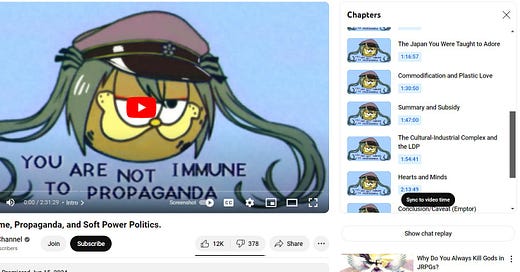


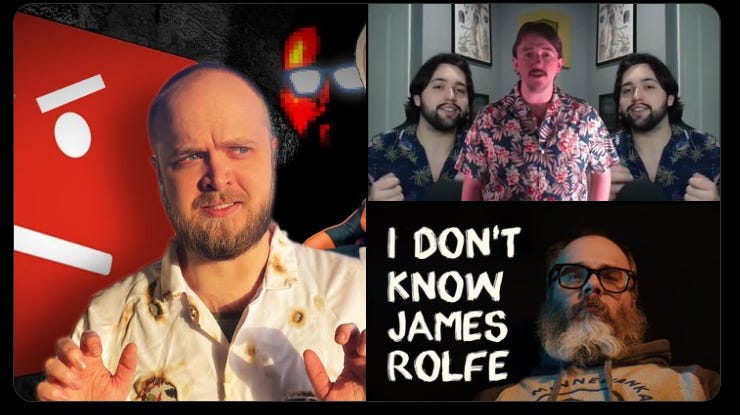
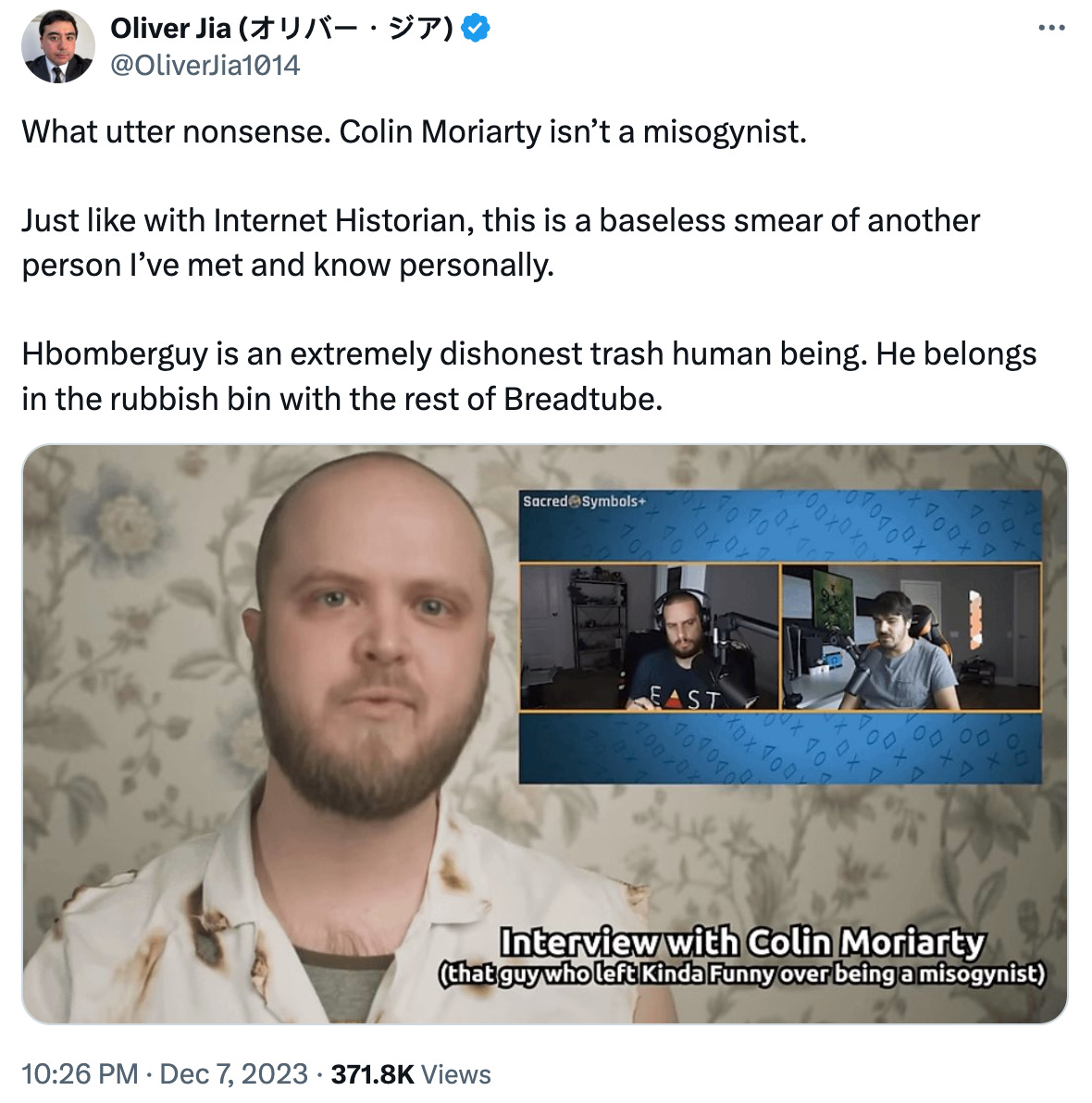





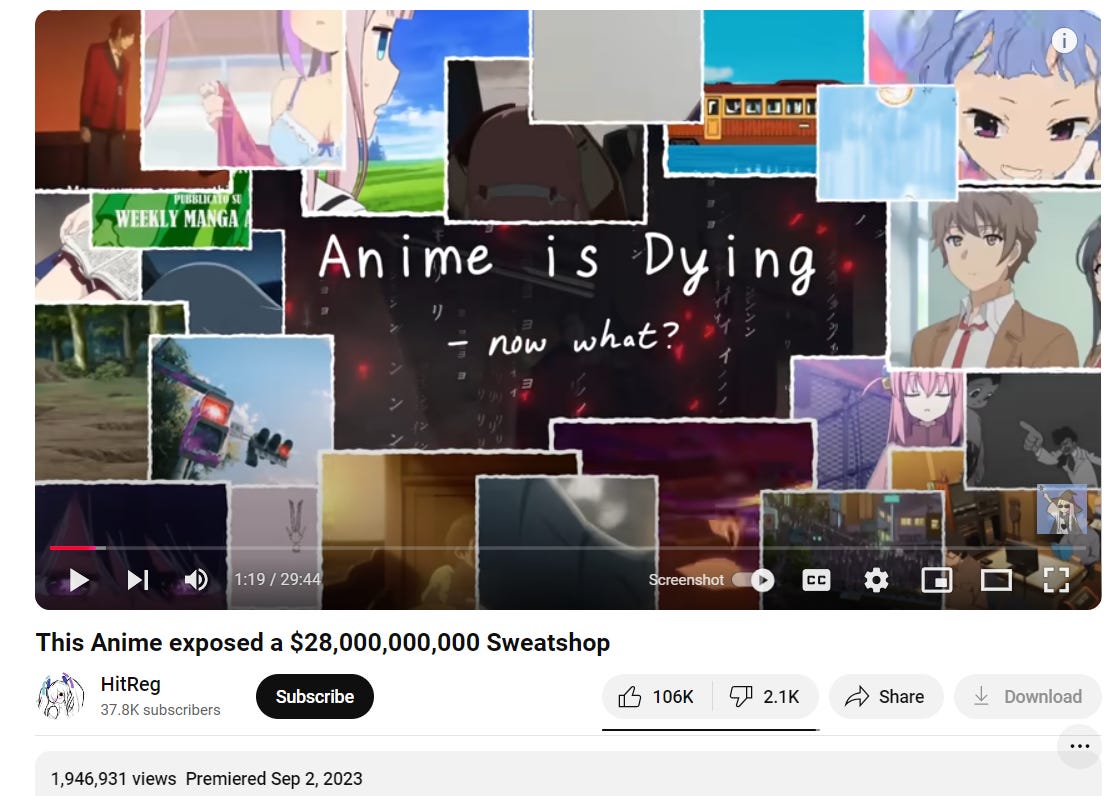
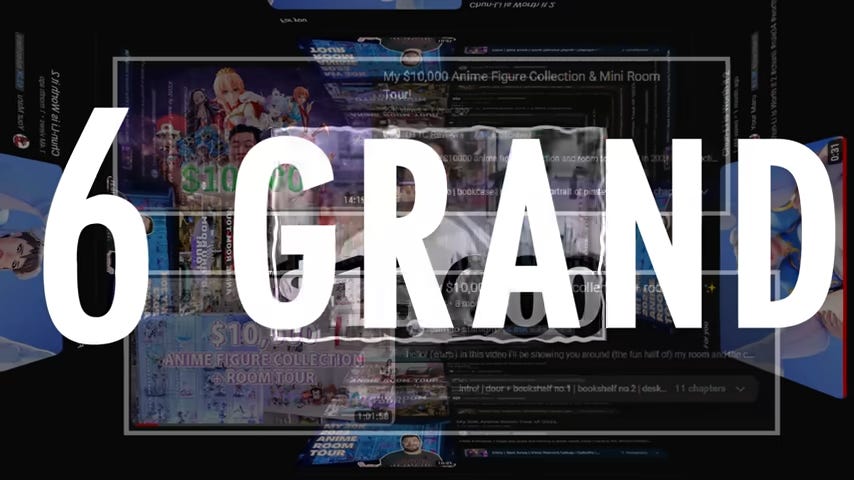
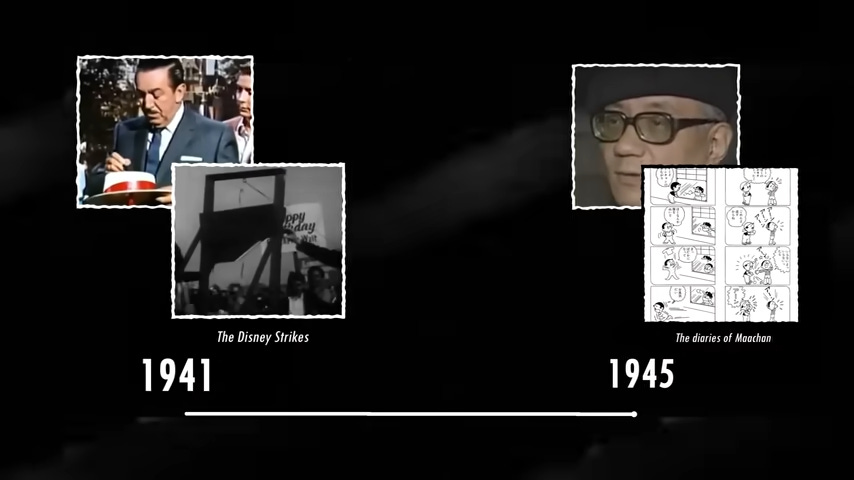



Good read. But, Kondo Hidezo the first chairman of the Japanese Cartoonists Association literally worked for the LDP and pumped out all sorts of propaganda for them, especially pro-nuclear